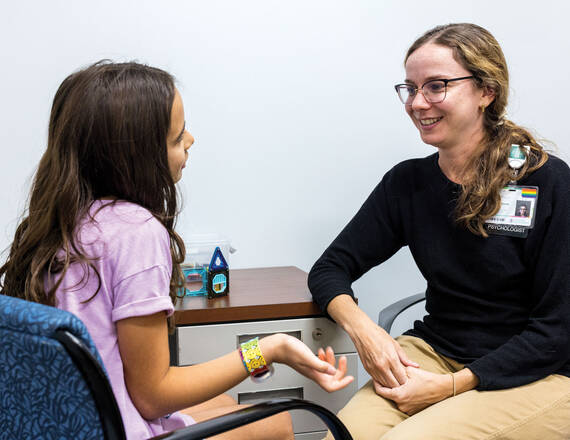Putting mental health into pediatric primary care
Child psychology fellowship improves care for vulnerable patients
Recognizing the rising rates of mental health challenges among youth, Dartmouth Health Children’s has been working to address the shortage of healthcare providers who can offer interventions to children and families.

In 2021, Dartmouth Health’s Department of Psychiatry created a permanent postdoctoral child psychology fellowship to embed specialized mental health support in the general pediatrics clinic at Dartmouth Hitchcock Medical Center (DHMC). The fellowship has been funded in part through the Pediatric Mental Health Access Initiative, the umbrella encompassing Dartmouth Health Children’s commitment to improving quality mental health care for children.
Now in its third year, the fellowship program has expanded to include two fellows who are training to address anxiety disorders, disruptive behavior disorders, mood disorders, and more.
“I wanted to be in clinical work because of the many hats psychologists wear—research, psychotherapy, cognitive assessments, and individual and family interventions,” says Christina Moore, PhD, FEL ’22, the first child psychologist to complete the fellowship. Moore was hired as a full-time faculty member at DHMC and an assistant professor of psychiatry and of pediatrics at Geisel School of Medicine. “That’s why an academic medical center is great: I can train others in evidence-based practices, be in the community to provide care, and be involved in research, learning how we can provide access to proven therapies—especially in underserved rural communities.”
Since being hired full time after her fellowship, Moore spends one day a week practicing in the primary care setting with a team of two post-doctoral psychology fellows and a pre-doctoral psychology trainee. Within one year, the team has seen approximately 350 children. Moore says primary care is a powerful place to reach children having mental health and behavioral problems, overcoming several potential barriers to care, such as stigma, transportation, and extra time away from work and school.
“We have increased children’s access to these evidence-based practices by catching them in a help-seeking moment with a caring pediatrician,” Moore says.
The child psychologist also works as a member of an integrated behavioral healthcare team, allowing a clinic to offer a continuum of mental health care services. For example, some clinics have behavioral health clinicians (BHCs) who offer short-term therapy for anxiety, disruptive behavior, substance use, and depression, while the psychologist may address needs that are outside those areas, are higher acuity or require diagnostic clarity.
“Access issues are big problems to solve.” Moore says. “It’s exciting to work with colleagues at Dartmouth Health Children’s who care deeply about increasing access to evidence-based services.”